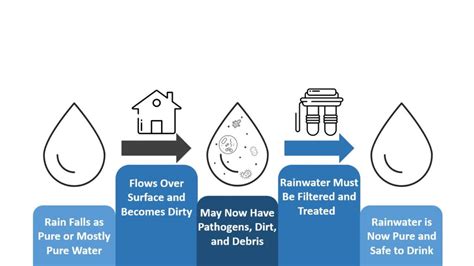How To Turn Rainwater Into Drinking Water
Ronan Farrow
Apr 03, 2025 · 3 min read

Table of Contents
How to Turn Rainwater into Drinking Water: A Comprehensive Guide
Collecting rainwater can be a fantastic way to conserve water and even supplement your drinking water supply, but it's crucial to understand that rainwater isn't safe to drink straight from the sky. It needs proper treatment to eliminate harmful contaminants and ensure it's potable. This guide will walk you through the process, from collection to purification.
Understanding Rainwater Contamination
Before we delve into purification, let's understand what makes rainwater unsafe for consumption. Rainwater, as it falls, picks up various pollutants from the atmosphere:
- Airborne pollutants: These include dust, pollen, soot, and industrial emissions. These can contain harmful chemicals and bacteria.
- Animal waste: Bird droppings, animal carcasses, and other organic matter can contaminate rainwater.
- Roofing materials: Your roof's composition greatly impacts water purity. Materials like asphalt shingles can leach chemicals into the water.
- Gutters and downspouts: These often accumulate debris, leaves, and other contaminants.
Collecting Rainwater Safely
The first step in obtaining potable rainwater is collecting it cleanly. Here's how:
Choosing a Collection System
- Rain barrels: These are the most common method, offering a relatively simple and affordable way to collect rainwater.
- Larger tanks: For greater volume, consider larger tanks made from food-grade materials like plastic.
- Roof Considerations: Ensure your roof is clean and free of debris before and during a rainfall. Consider using a gutter filter to prevent leaves and other materials from entering your collection system.
Cleaning Your Collection System
Regular cleaning is paramount. Before each rain event, clean your gutters, downspouts, and collection system. After each collection, thoroughly clean and sanitize your storage tank to prevent contamination and bacterial growth.
Purifying Rainwater for Drinking
Now that you've collected rainwater, it's time for the essential purification stage. Multiple methods exist, offering varying levels of purification:
Boiling
Boiling is a simple and effective method for eliminating most harmful bacteria and viruses. Bring the rainwater to a rolling boil for at least one minute to ensure its safety.
Filtering
Filtering removes sediment, larger particles, and some contaminants. Consider using a combination of filters, such as:
- Sediment filters: Remove larger particles.
- Carbon filters: Absorb many chemicals and improve taste and odor.
- Ultraviolet (UV) filters: Kill bacteria and viruses through ultraviolet light.
It is important to note that filtering alone might not be sufficient, it's best to combine it with other methods.
Distillation
Distillation is a more advanced method that involves boiling the water and collecting the condensed steam. This process removes most impurities, producing highly purified water. However, it requires specialized equipment.
Chemical Treatment
Chemical treatment, though often less preferred, involves the use of water purification tablets or other chemicals. Follow the manufacturer's instructions carefully, as incorrect usage can be hazardous.
Testing Your Rainwater
It is always strongly recommended to test your purified rainwater before drinking it. A water testing kit can measure the presence of harmful contaminants like bacteria and chemicals. This gives you peace of mind and ensures its suitability for consumption.
Conclusion
Turning rainwater into drinking water requires a multi-step process involving careful collection and rigorous purification. Remember that safety is paramount, and combining various methods often provides the best results. Always test your water before drinking to ensure it's free from harmful contaminants. By following these guidelines, you can safely harvest and utilize this valuable resource.
Featured Posts
Also read the following articles
| Article Title | Date |
|---|---|
| Dexamethasone For Pigs Dosage How Many Days | Apr 03, 2025 |
| Gordie Howe Jersey For Sale | Apr 03, 2025 |
| How To Wear Sling Bag Men | Apr 03, 2025 |
| How To Winterize A Rv Ice Maker | Apr 03, 2025 |
| Ghk Cu Powder How To Use | Apr 03, 2025 |
Latest Posts
Thank you for visiting our website which covers about How To Turn Rainwater Into Drinking Water . We hope the information provided has been useful to you. Feel free to contact us if you have any questions or need further assistance. See you next time and don't miss to bookmark.
